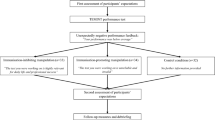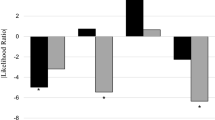Abstract
Past research has demonstrated that depressed individuals tend to distort their recall of positive feedback in a negative fashion. In the current study an attempt was made to replicate the finding and then to stop this negative distortion through a self-correction (reality-testing) procedure. Groups of depressed and nondepressed college students were randomly assigned to high positive (HP) or low positive (LP) feedback conditions. In the first half of the study, there was a replication of the cognitive distortion of HP feedback by the depressed group. The reality-testing procedure invoked in the second half of the study, however, made no impact on the cognitive distortions made by the depressed group under HP feedback conditions. Under conditions of LP feedback, the reality-testing procedure had the paradoxical effect of increasing the distortions shown by the depressed group. The implications of this study for therapy were elaborated upon and the utility of reality testing, as an isolated treatment component, was called into question.
Similar content being viewed by others
References
Beck, A. T. The development of depression: A cognitive model. In R. Friedman & M. M. Katz (Eds.),The psychology of depression: Contemporary theory and research. Washinton, D.C.: Wiley, 1974.
Beck, A. T.Cognitive therapy and the emotional disorders. New York: International Universities Press, 1976.
Beck, A. T., Rush, A. J., Shaw, B. F., & Emery, G.Cognitive therapy of depression: A treatment manual. New York: Guilford Press, 1979.
Beck, A. T., Ward, C. H., Mendelson, M., Mock, J., & Erbaugh, J. An inventory for measuring depression.Archives of General Psychiatry 1961,4 561–571.
Craighead, W. E., Hickey, K. S., & DeMonbreun, B. G. Distortion of perception and recall of neutral feedback in depression.Cognitive Therapy and Research 1979,3(3), 291–298.
DeMonbreun, B. F., & Craighead, W. E. Distortion of perception and recall of positive and neutral feedback in depression.Cognitive Therapy and Research 1977,1(4), 311–330.
Jackson, B. Treatment of depression by self-reinforcement.Behavior Therapy 1972,3 298–307.
Kirk, R. E.Experimental design: Procedures for the behavioral sciences. Monterey, California: Brooks/Cole, 1968.
Lazarus, A. A. Learning theory and the treatment of depression.Behaviour Research and Therapy 1968,6 83–89.
Lewinsohn, P. M. The behavioral study and treatment of depression. In M. Hersen, R. W. Eisler, & P. M. Miller (Eds.),Progress in behavior modification Vol. 1). New York: Academic Press, 1975.
Lewinsohn, P. M., Biglan, T., & Zeiss, A. Behavioral treatment of depression. In P. Davidson (Ed.),The behavioral management of anxiety, depression and pain. New York: Brunner/Mazel, 1976.
Lewinsohn, P. M., Lobitz, W. C., & Wilson, S. “Sensitivity” of depressed individuals to aversive stimuli.Journal of Abnormal Psychology 1973,81 259–263.
Lewinsohn, P. M., Mischel, W., Chaplin, W., & Barton, R. Social competence and depression: The role of illusory self-perceptions?Journal of Abnormal Psychology 1980,89(2), 203–212.
Nelson, R. E., & Craighead, W. E. Perception of reinforcement, self-reinforcement and depression.Journal of Abnormal Psychology 1977,86 379–388.
Shaw, B. F., & Dobson, K. S. Depression. In T. V. Merluzzi, C. R. Glass, & M. Genest (Eds.),Cognitive assessment. New York: Guilford Press, 1981.
Wener, A. E., & Rehm, L. P. Depressive affect: A test of behavioral hypotheses.Journal of Abnormal Psychology 1975,84 221–227.
Zuckerman, M., Persky, H., & Curtis, G. C. Relationship among anxiety, depression and autonomic variables.Journal of Nervous and Mental Disease 1968,146 481–487.
Author information
Authors and Affiliations
Additional information
This research was supported by grant number MA-6370 to Brian F. Shaw from the Medical Research Council of Canada and by grant number MH-35016-01 from the National Institute of Mental Health. The authors are indebted to W. E. Craighead, Bruce Leslie, and Deborah J. G. Dobson for their assistance with the project.
Rights and permissions
About this article
Cite this article
Dobson, K.S., Shaw, B.F. The effects of self-correction on cognitive distortions in depression. Cogn Ther Res 5, 391–403 (1981). https://doi.org/10.1007/BF01173691
Issue Date:
DOI: https://doi.org/10.1007/BF01173691




